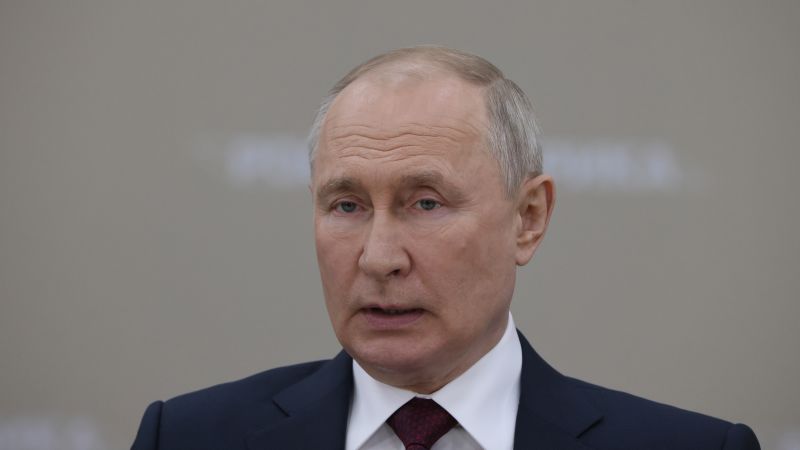Russian President Vladimir Putin’s absence from the BRICS summit in Johannesburg speaks volumes about Russia’s isolation and Putin’s shrinking horizons. While other leaders from the BRICS economic bloc are expected to attend, Putin will not be there. This is significant because Putin is a staunch proponent of a “multipolar world order” and sees structures like the BRICS as a counterweight to Western-led institutions that have condemned Russia for its war on Ukraine. Despite facing broad condemnation from the West, Russia is still actively seeking international influence and support, particularly in the global south.
One might wonder why Putin would miss an opportunity to promote his vision. One reason could be the warrant issued by the International Criminal Court (ICC) for Putin and another Russian official for an alleged scheme to deport Ukrainian children to Russia. As a signatory to the ICC treaty, South Africa is obligated to arrest individuals indicted by the court, putting them in a bind. However, it is unlikely that Putin would be arrested on the tarmac in Johannesburg, as previous indicted leaders have managed to avoid such a fate.
The Kremlin denies that Putin’s absence is due to the ICC warrant, but regardless of the motive, it does not look good for Moscow. Russia is trying to portray itself as a staunchly anti-colonial power that supports a more just and equitable world order. Russian Foreign Minister Lavrov recently laid out the main talking points, criticizing the concept of Western domination and accusing the US and its allies of trying to slow down the natural evolution of international relations. The irony here is that Russia is waging a war on Ukraine, justifying it in imperial terms, while claiming to be fighting for a multipolar world.
In conclusion, Putin’s absence from the BRICS summit highlights Russia’s isolation and Putin’s shrinking horizons. Despite facing condemnation from the West, Russia is still actively seeking international influence and support. The ICC warrant for Putin adds another layer of complexity to his absence, but regardless of the motive, it does not bode well for Moscow. Russia’s PR campaign to portray itself as an anti-colonial power is undermined by its actions in Ukraine.
Unveiling Putin’s Shrinking Horizons: The Startling BRICS No-Show
In recent years, the BRICS (Brazil, Russia, India, China, and South Africa) alliance has emerged as a significant force in global politics and economics. These five nations, representing a substantial portion of the world’s population and GDP, have been seen as potential challengers to the established Western-dominated order. However, the recent absence of Russian President Vladimir Putin from the BRICS summit has raised eyebrows and sparked concerns about the future of this once-promising alliance.
The BRICS alliance was formed in 2009 with the aim of promoting cooperation and development among its member countries. At the time, it was seen as a counterbalance to the dominance of Western powers, particularly the United States and Europe. The alliance was also seen as a platform for emerging economies to assert their influence on the global stage and challenge the existing economic and political order.
Russia, under the leadership of President Putin, has been a key player within the BRICS alliance. With its vast natural resources, military might, and geopolitical ambitions, Russia has been seen as a crucial partner for the other BRICS nations. However, Putin’s absence from the recent BRICS summit in India has raised concerns about Russia’s commitment to the alliance and its future role within it.
The reasons behind Putin’s no-show at the BRICS summit are not entirely clear. Some speculate that it may be a result of Russia’s deteriorating relations with the West, particularly the European Union and the United States. The imposition of economic sanctions on Russia following its annexation of Crimea in 2014 has strained its relations with the West and led to a significant decline in its economic growth. As a result, Putin may be prioritizing his efforts to mend ties with the West rather than focusing on the BRICS alliance.
Another possible reason for Putin’s absence could be Russia’s own economic challenges. The country has been grappling with low oil prices, economic stagnation, and a declining population. These internal issues may have forced Putin to divert his attention and resources away from the BRICS alliance and focus on domestic concerns.
Furthermore, the recent geopolitical developments in the region, such as the rise of China as a global economic powerhouse and the increasing tensions between India and China, may have also influenced Putin’s decision to skip the BRICS summit. Russia’s own interests and priorities may no longer align with those of the other BRICS nations, making its participation in the alliance less relevant.
Whatever the reasons behind Putin’s absence, it is clear that the BRICS alliance is facing significant challenges. Without the active participation of all its member countries, the alliance risks losing its credibility and effectiveness. The absence of Russia, one of the key players within the alliance, raises questions about the future direction and purpose of the BRICS.
The BRICS alliance was once seen as a potential alternative to the Western-dominated global order. However, with Putin’s shrinking horizons and the challenges faced by its member countries, the alliance’s ability to challenge the existing order seems increasingly uncertain. The absence of Russia from the recent BRICS summit serves as a stark reminder of the shifting dynamics within the alliance and the need for its member countries to reassess their priorities and commitments.
In conclusion, Putin’s no-show at the recent BRICS summit has raised concerns about the future of this once-promising alliance. The reasons behind his absence may be rooted in Russia’s deteriorating relations with the West, its own economic challenges, or the changing geopolitical dynamics in the region. Whatever the reasons, the absence of Russia from the BRICS alliance raises questions about its future relevance and effectiveness. The other member countries must now grapple with the challenge of revitalizing the alliance and redefining its purpose in a rapidly changing global landscape.








